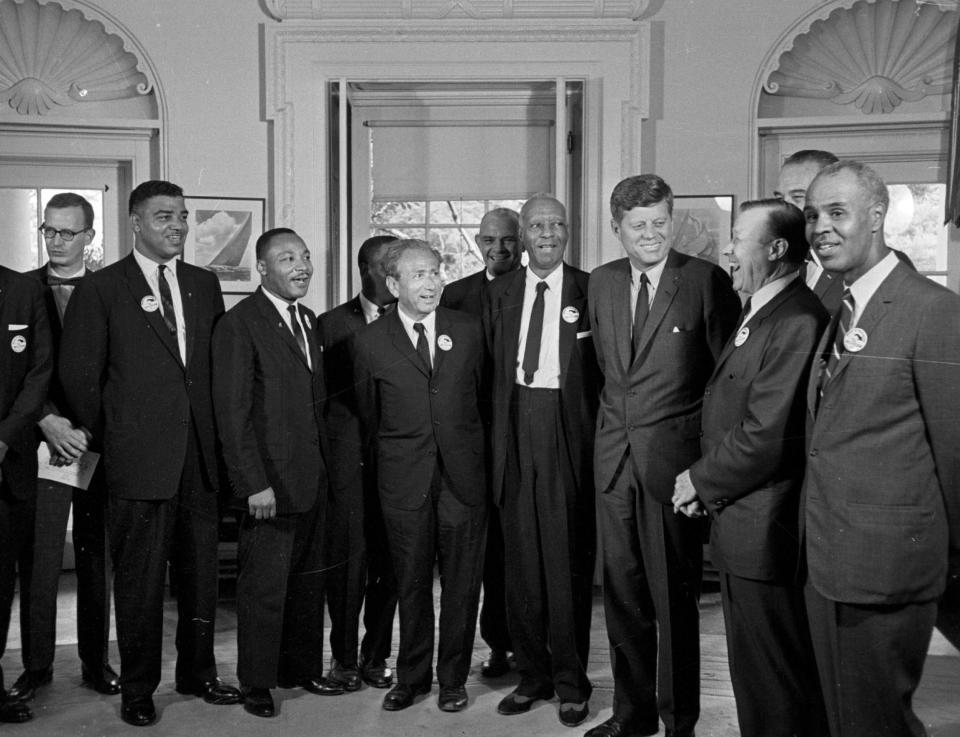Martin Luther King Jr. would want Jewish & African Americans to stand united against hate
The Rev. Martin Luther King Jr. was assassinated April 4, 1968, on the balcony of the Lorraine Motel in Memphis, Tennessee, where he journeyed, mostly unheralded, to rally support for poor sanitation workers. Just days before his death, he spoke at an upstate New York celebration for Rabbi Abraham Joshua Heschel. It was attended by 1,000 rabbis who sang “We Shall Overcome” in Hebrew, in honor of both the rabbi and the reverend.
King wanted African Americans to remember the contributions made by Jews to the civil rights cause — among them college students like Michael Schwerner and Andrew Goodman, martyred alongside Mississippian James Chaney during the Freedom Summer of 1964; and Heschel, a refugee from Hitler, who marched with King in the voting rights march in Selma, Alabama, in 1965.
He believed that the experience of Jews during the Holocaust was significant for the civil rights movement. "There isn't anyone in this country more likely to understand our struggle than Jews," his lawyer and close adviser, Clarence B. Jones, said King told him. "Whatever progress we've made so far as a people, their support has been essential." This was clear when King chose Joachim Prinz, a rabbi in pre-World War II Berlin who fled Hitler to become president of the American Jewish Congress, to be the speaker just before King himself delivered his historic “I Have a Dream” speech from the steps of the Lincoln Memorial in 1963.
King's road map for today
King was a modern-day Moses who led his people to the Promised Land — but, like Moses of old, did not live to enter it. He prophesied in his last published remarks that though he might not get there, “I want you to know tonight, that we, as a people, will get to the Promised Land.”
Who among us should not recognize the parallels — and feel the pain — embedded in the histories of Jews and African Americans? It is up to both communities today to make sure his message endures and triumphs.
King's invoking of the Hebrew prophets galvanized many young American Jews like us. He often quoted the Hebrew prophet Amos that “justice rolls down like waters and righteousness like a mighty stream.”
Justice was preeminent for King. Yet he never believed in justice for “just us.” He built not only bridges among religions and races, but also ladders to a transcendent unity based on principles of peace and morality.

This is the road map we must follow today. Unfortunately, too many Americans have acted like justice for all is a bridge too far. Soon after the Rev. King’s assassination, there were frictions between African Americans and Jews over affirmative action. Then there were recriminations over support for Israel versus the rights of Palestinians. To make matters worse, the Nation of Islam’s Minister Louis Farrakhan called Hitler “a great man” and Judaism “a dirty religion.” Today, at almost 90 years old, Farrakhan is still preaching and finding an audience for his gospel of hate.
What you can do: Honor MLK by recognizing, opposing injustice
How can we, American Jews and African Americans, recapture our past alliances, and why is it so important that we try? Honoring great men like King and Heschel is part, but only part, of the reason.
Jews, blacks must revitalize our bond
We need to do so, not just to commemorate the past, but also to build a better future. Let’s be specific. America is no longer just a story of whites being challenged to recognize black rights, as it was in King’s lifetime. Our country is changing fast demographically. By 2045, we will be a country where minorities are a majority of the population. Already, the United States has more Latinos, native-born and immigrant, than African Americans.
American Jews, too, face changing demographics. The time is not far off when Muslim Americans will equal and then exceed the number of Jews. The old days when African Americans and Jews were America’s two classic minorities are being challenged by new realities — and new players in inter-group relations.
Martin Luther King III: Respect and reason work better than political insults
This is precisely why both peoples need to revitalize their relationship at the same time as they reach out for new allies. The civil rights coalition of the future will extend beyond African Americans and Jews to Latino Americans and Asian Americans as well as the LGBT community. It will have to grapple with new issues like criminal justice reform and the status of the undocumented. But it will also have to reaffirm the mutual commitments that are the foundation of our alliances.
For Jews, this means support in the battle against anti-Semitism and recognition of Israel’s right to exist as a democratic Jewish state side by side in peace with the Palestinians.
King — who was inspired by India’s prophet of nonviolence, Mahatma Gandhi — would urge us, too, to learn from others and change with the times while remaining faithful to the eternal values of freedom and justice that we share. True for both Jews and African Americans, this is a message worthy of MLK’s time — and our own.
Rabbi Abraham Cooper is associate dean and director of Global Social Action Agenda for the Simon Wiesenthal Center. Dr. Harold Brackman, a historian, is a consultant to the Simon Wiesenthal Center and its Museum of Tolerance.
You can read diverse opinions from our Board of Contributors and other writers on the Opinion front page, on Twitter @usatodayopinion and in our daily Opinion newsletter. To respond to a column, submit a comment to letters@usatoday.com.
This article originally appeared on USA TODAY: On Martin Luther King Day, strengthen Jewish-African American alliance

